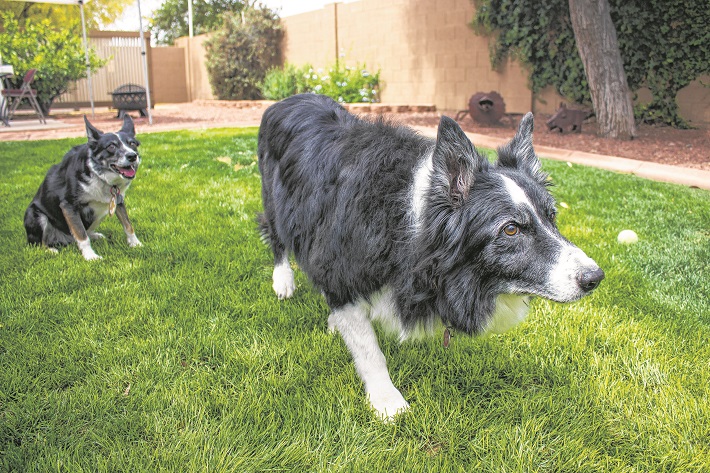
By Deborah Hillcove
In this springtime season of hope and renewal, a small group of volunteers demonstrated the power of love.
Laurel Todd, a Tempe resident and longtime volunteer with Arizona Border Collie Rescue, recently hosted a reunion of the “Texas 21,” a nickname referring to 21 border collies rescued from horrific conditions in an out-of-state breeding operation and puppy mill.
Only seven of the 21 were able to attend, but one by one, the rescues arrived:
Dylan, Kruz, Sarah, Rusty, Lyric, Sketch and Tucker.
They waited to be leashed then, tails tucked, joined their owners who celebrated the sixth anniversary of the massive rescue.
Kelly Quinn, ABCR president, explained that even after six years of rehabilitation, the dogs suffered such mistreatment that they are still afraid.
“They’ll never be totally okay,” she said, “but this reunion is a very special event. We’re recognizing the efforts of our volunteers in one of the most difficult rescues we’ve ever undertaken. There were so many dogs and that was difficult, but these were the most shut-down, the least socialized rescues we’ve ever taken in.
“It’s almost surreal to see how far they’ve come.”
Back in April 2011, a Jefferson, Texas, breeding operation and puppy mill was seized and shut down, leaving more than 167 border collies at risk.
“The Texas group was overwhelmed,” Quinn said, “and they were unable to care for so many dogs. They posted the story on social media and contacted border collie rescue groups nationwide. They shared a video showing the squalid conditions in which they found the dogs.”
Said Quinn:
“It was horrible. Puppies, adults and seniors, living in filthy, rusty, metal cages stacked one on top of another. They were malnourished, lonely and afraid. Some had spread paws from trying to balance on the wire flooring, like chicken wire. Some were trapped in cages with sick or dead dogs. The owner had gotten sick and just left the dogs to fend for themselves. Maybe once a week, he’d empty bags of food on the ground. “
ACBR Vice President Gail Chadwick emphasized the community effort of the rescue.
“The need broke our hearts,” she said. “The volunteers were amazing. We found foster homes for 21 dogs.”
Todd and five other Arizona volunteers borrowed three vans, loaded them with animal crates and drove a little over 10 hours and 700 miles to Odessa, where they coordinated the rescue.
“Some of the dogs wagged their tails at the sight of a human,” Todd said, “but others tucked their tails and seemed terrified, backing away and fearing to come out of their cages.”
The dogs were carefully collared and leashed, eased into clean crates for the long trip back to Arizona. Once in Phoenix, the newly freed collies were microchipped and placed in foster homes, where their physical and emotional rehabilitation were tended to, preparing them for adoption into forever homes.
Patience and love helped rescue these dogs. One stayed in foster care for three years before he was ready to be adopted. Another, Dylan, was one of the most shut-down. He didn’t even know how to eat from a bowl. His foster parent sat on the ground near him and hand-fed him for two weeks until he finally began to trust her and eat normally.
Now his owner, Ann-Renee Jones, has enrolled this black-and-white fellow in agility training.
“The dogs are beginning to come out of their shells, Todd said. “Several have been exceptional, winning titles in herding and agility competitions.”
An example is Kruz, another of the more troubled dogs, who was adopted by Kim O’Connor. She worked with him, imparting confidence until she felt he was able to compete in events. He did very well, although recently he’s been sidelined with hip surgery.
Reflecting on the 2011 rescue, Quinn said, “It was a massive endeavor and the first time we ever took on a national rescue. We may not ever see anything like it again. I’m sure none of us will ever forget it, and we’ll revisit the event for years to come.”
Chadwick agreed and summarized the experience, saying:
“We’ll continue celebrating, meeting from time to time. The rescue was horrendous, a once-in-a- lifetime event, and it makes me so proud of our volunteers, proud of our efforts. We [ACBR] do good work every day, but this represents the best of what we’ve accomplished—the very best we could b
A 501(c)(3) nonprofit, ABCR relies on volunteers to foster border collies and to staff events and assist with administrative tasks. For more information about volunteering with ABCR, adopting or relinquishing a
border collie, visit azbcr.org or the Arizona Border Collies Rescue group on YouTube or Facebook.

